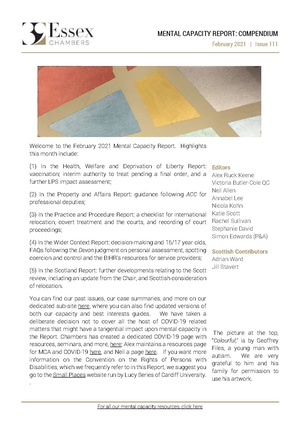Information for "Devon Partnership NHS Trust v SSHSC (2021) EWHC 101 (Admin)"
Basic information
| Display title | Devon Partnership NHS Trust v SSHSC [2021] EWHC 101 (Admin) |
| Default sort key | Devon Partnership NHS Trust v SSHSC (2021) EWHC 101 (Admin) |
| Page length (in bytes) | 3,518 |
| Page ID | 11276 |
| Page content language | en - English |
| Page content model | wikitext |
| Indexing by robots | Allowed |
| Number of redirects to this page | 0 |
| Counted as a content page | Yes |
| Page image |  |
Page protection
| Edit | Allow only users with "editing" permission (infinite) |
| Move | Allow only users with "editing" permission (infinite) |
Edit history
| Page creator | Jonathan (talk | contribs) |
| Date of page creation | 22:35, 23 January 2021 |
| Latest editor | Jonathan (talk | contribs) |
| Date of latest edit | 16:54, 26 February 2022 |
| Total number of edits | 15 |
| Total number of distinct authors | 1 |
| Recent number of edits (within past 90 days) | 0 |
| Recent number of distinct authors | 0 |
Page properties
SEO properties
Description | Content |
Article description: (description)This attribute controls the content of the description and og:description elements. | In this case the Trust sought declarations that the s12 requirement that a medical practitioner must have "personally examined" a patient before completing a medical recommendation and the s11 requirement that an AMHP must have "personally seen" the patient before making an application (both requirements being in relation to s2, 3, 4 and 7) could be met by remote means, as suggested in NHS, 'Legal guidance for mental health, learning disability and autism, and specialised commissioning services supporting people of all ages during the coronavirus pandemic' (v2, 19/5/20). (1) The High Court agreed to give an advisory opinion on statutory construction in this exceptional case, as there was a real (not hypothetical or academic) question, the Trust had a real interest in it, and the court had heard proper argument. (2) The High Court decided that both phrases require the physical attendance of the person in question on the patient, because of the following six considerations: (a) in this country, powers to deprive people of their liberty are generally exercised by judges and where, exceptionally, statute authorises administrative detention the powers are to be construed particularly strictly; (b) splitting up the compound phrases into individual words fails to capture their true import as understood when enacted; (c) Parliament understood the medical examination as necessarily involving physical presence (confirmed by the word "visiting" used elsewhere, and the fact that psychiatric assessment may involve a multi-sensory assessment); (d) it is not appropriate to apply an "updating construction", as the words were intended to be restrictive and circumscribed, and when enacted were understood as connoting physical presence; (e) medical examinations should ideally be carried out face-to-face (the Code of Practice and guidance both state this is preferable), and it is for Parliament to weigh up the competing interests (namely the need to ensure that administrative deprivations of liberty are properly founded on objective evidence and the need to maintain the system of MHA detention given the exigencies of the pandemic); (f) interpretation by the court would be applicable immediately and may remain in force for some time after the end of the current pandemic, but modification by Parliament could involve ongoing judgement on whether to bring them into force and whether to make them time limited. |